Analysis of Carbohydrate's Role as an Essential Nutrient
VerifiedAdded on 2020/01/06
|6
|1971
|157
Essay
AI Summary
This essay delves into the nutritional value of carbohydrates, examining their role in providing energy for the human body. It investigates whether carbohydrates are essential nutrients, exploring their impact on muscle, heart, and brain function. The essay analyzes the sources of carbohydrates in the diet, such as fruits, grains, and processed foods, and discusses the recommended daily intake. It presents arguments both for and against the necessity of carbohydrates, considering the body's ability to utilize alternative energy sources like amino acids and fats. The study reviews scientific findings and experimental studies, including the effects of carbohydrate-free diets, to determine if carbohydrate deficiency syndromes exist. Ultimately, the essay concludes that while carbohydrates are a significant component of the human diet and a cheap energy source, they are not strictly essential nutrients, as the body can adapt to their absence through a balanced diet, with no evidence of severe deficiency symptoms. The essay is supported by references to relevant books, journals and online resources.
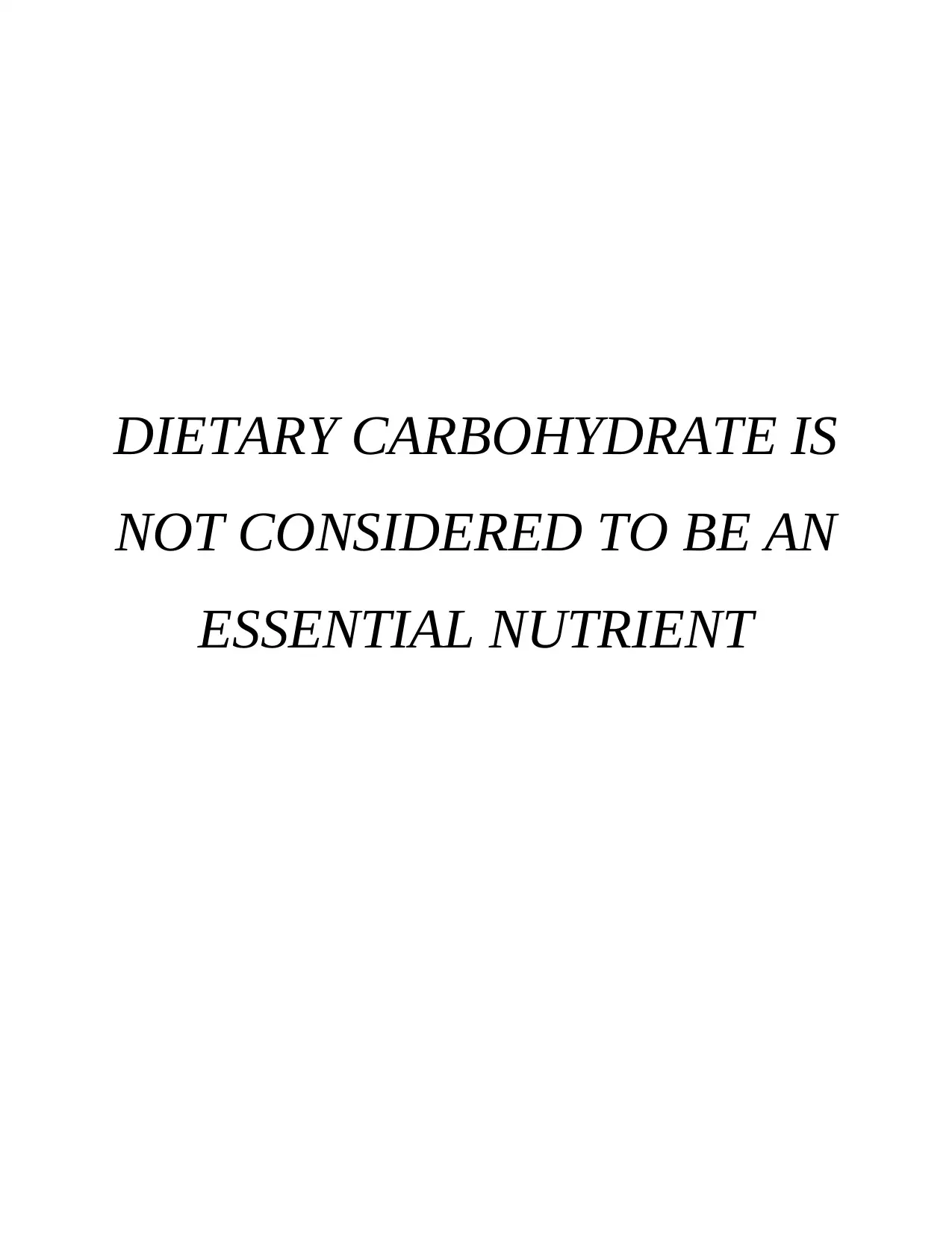
DIETARY CARBOHYDRATE IS
NOT CONSIDERED TO BE AN
ESSENTIAL NUTRIENT
NOT CONSIDERED TO BE AN
ESSENTIAL NUTRIENT
Paraphrase This Document
Need a fresh take? Get an instant paraphrase of this document with our AI Paraphraser
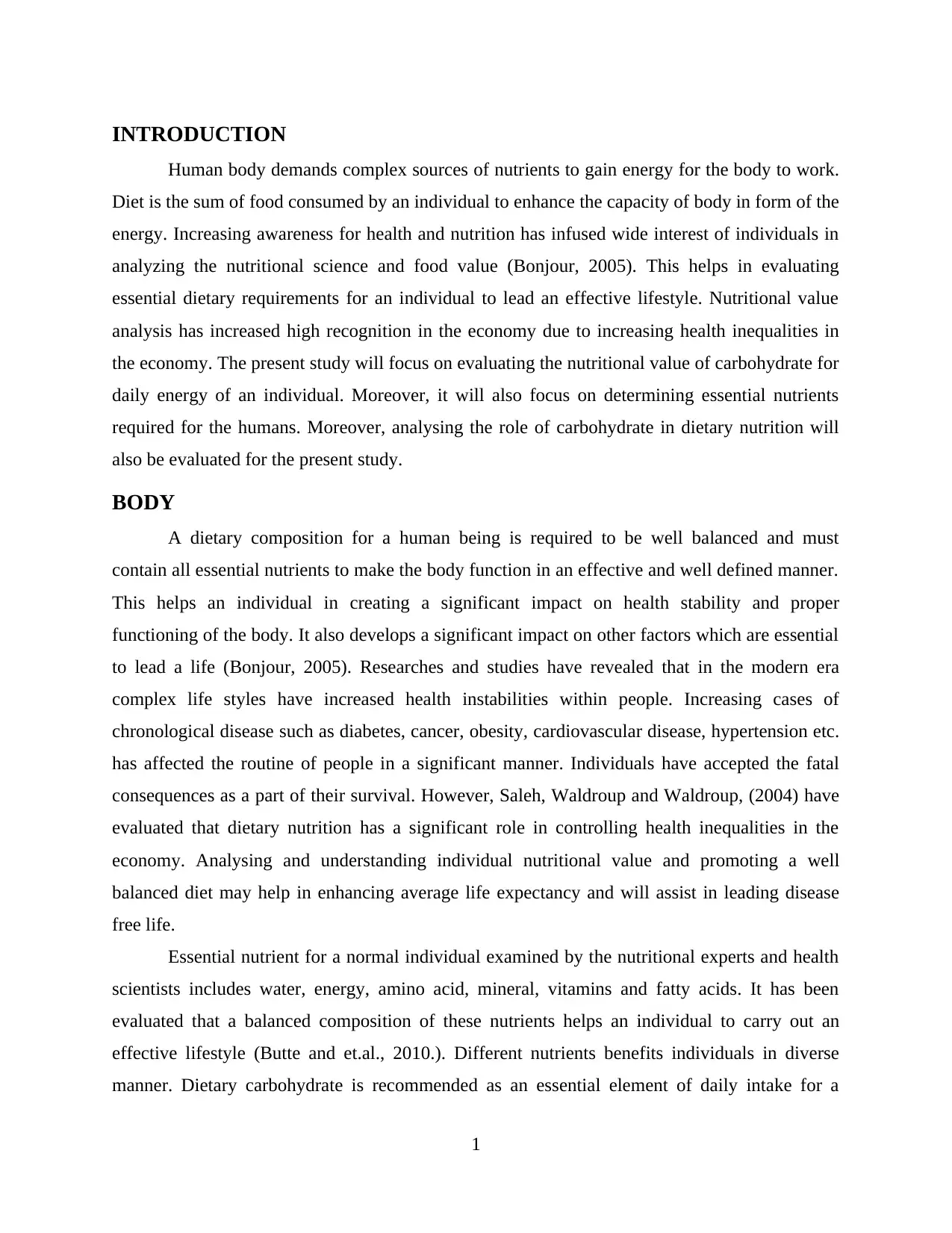
INTRODUCTION
Human body demands complex sources of nutrients to gain energy for the body to work.
Diet is the sum of food consumed by an individual to enhance the capacity of body in form of the
energy. Increasing awareness for health and nutrition has infused wide interest of individuals in
analyzing the nutritional science and food value (Bonjour, 2005). This helps in evaluating
essential dietary requirements for an individual to lead an effective lifestyle. Nutritional value
analysis has increased high recognition in the economy due to increasing health inequalities in
the economy. The present study will focus on evaluating the nutritional value of carbohydrate for
daily energy of an individual. Moreover, it will also focus on determining essential nutrients
required for the humans. Moreover, analysing the role of carbohydrate in dietary nutrition will
also be evaluated for the present study.
BODY
A dietary composition for a human being is required to be well balanced and must
contain all essential nutrients to make the body function in an effective and well defined manner.
This helps an individual in creating a significant impact on health stability and proper
functioning of the body. It also develops a significant impact on other factors which are essential
to lead a life (Bonjour, 2005). Researches and studies have revealed that in the modern era
complex life styles have increased health instabilities within people. Increasing cases of
chronological disease such as diabetes, cancer, obesity, cardiovascular disease, hypertension etc.
has affected the routine of people in a significant manner. Individuals have accepted the fatal
consequences as a part of their survival. However, Saleh, Waldroup and Waldroup, (2004) have
evaluated that dietary nutrition has a significant role in controlling health inequalities in the
economy. Analysing and understanding individual nutritional value and promoting a well
balanced diet may help in enhancing average life expectancy and will assist in leading disease
free life.
Essential nutrient for a normal individual examined by the nutritional experts and health
scientists includes water, energy, amino acid, mineral, vitamins and fatty acids. It has been
evaluated that a balanced composition of these nutrients helps an individual to carry out an
effective lifestyle (Butte and et.al., 2010.). Different nutrients benefits individuals in diverse
manner. Dietary carbohydrate is recommended as an essential element of daily intake for a
1
Human body demands complex sources of nutrients to gain energy for the body to work.
Diet is the sum of food consumed by an individual to enhance the capacity of body in form of the
energy. Increasing awareness for health and nutrition has infused wide interest of individuals in
analyzing the nutritional science and food value (Bonjour, 2005). This helps in evaluating
essential dietary requirements for an individual to lead an effective lifestyle. Nutritional value
analysis has increased high recognition in the economy due to increasing health inequalities in
the economy. The present study will focus on evaluating the nutritional value of carbohydrate for
daily energy of an individual. Moreover, it will also focus on determining essential nutrients
required for the humans. Moreover, analysing the role of carbohydrate in dietary nutrition will
also be evaluated for the present study.
BODY
A dietary composition for a human being is required to be well balanced and must
contain all essential nutrients to make the body function in an effective and well defined manner.
This helps an individual in creating a significant impact on health stability and proper
functioning of the body. It also develops a significant impact on other factors which are essential
to lead a life (Bonjour, 2005). Researches and studies have revealed that in the modern era
complex life styles have increased health instabilities within people. Increasing cases of
chronological disease such as diabetes, cancer, obesity, cardiovascular disease, hypertension etc.
has affected the routine of people in a significant manner. Individuals have accepted the fatal
consequences as a part of their survival. However, Saleh, Waldroup and Waldroup, (2004) have
evaluated that dietary nutrition has a significant role in controlling health inequalities in the
economy. Analysing and understanding individual nutritional value and promoting a well
balanced diet may help in enhancing average life expectancy and will assist in leading disease
free life.
Essential nutrient for a normal individual examined by the nutritional experts and health
scientists includes water, energy, amino acid, mineral, vitamins and fatty acids. It has been
evaluated that a balanced composition of these nutrients helps an individual to carry out an
effective lifestyle (Butte and et.al., 2010.). Different nutrients benefits individuals in diverse
manner. Dietary carbohydrate is recommended as an essential element of daily intake for a
1
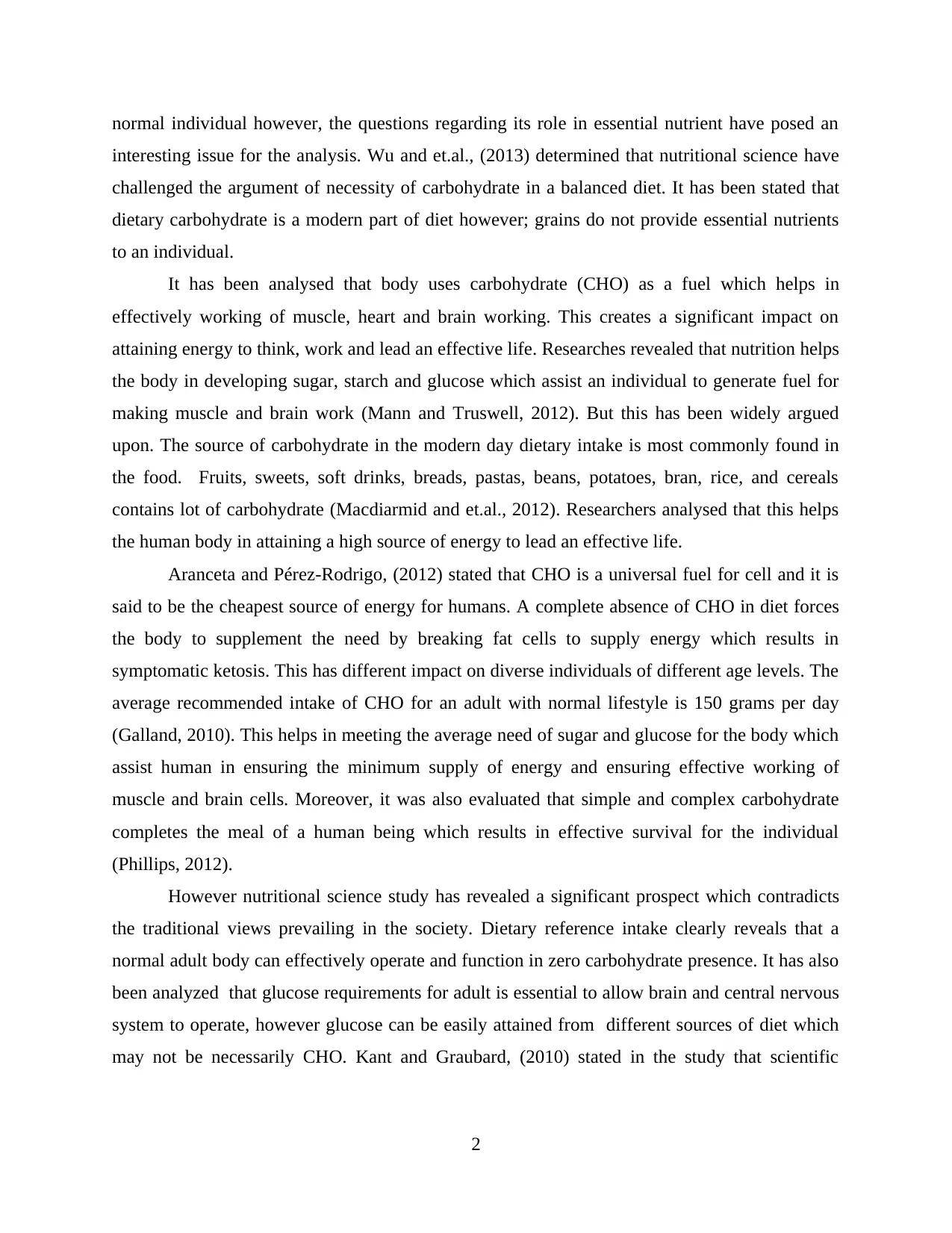
normal individual however, the questions regarding its role in essential nutrient have posed an
interesting issue for the analysis. Wu and et.al., (2013) determined that nutritional science have
challenged the argument of necessity of carbohydrate in a balanced diet. It has been stated that
dietary carbohydrate is a modern part of diet however; grains do not provide essential nutrients
to an individual.
It has been analysed that body uses carbohydrate (CHO) as a fuel which helps in
effectively working of muscle, heart and brain working. This creates a significant impact on
attaining energy to think, work and lead an effective life. Researches revealed that nutrition helps
the body in developing sugar, starch and glucose which assist an individual to generate fuel for
making muscle and brain work (Mann and Truswell, 2012). But this has been widely argued
upon. The source of carbohydrate in the modern day dietary intake is most commonly found in
the food. Fruits, sweets, soft drinks, breads, pastas, beans, potatoes, bran, rice, and cereals
contains lot of carbohydrate (Macdiarmid and et.al., 2012). Researchers analysed that this helps
the human body in attaining a high source of energy to lead an effective life.
Aranceta and Pérez-Rodrigo, (2012) stated that CHO is a universal fuel for cell and it is
said to be the cheapest source of energy for humans. A complete absence of CHO in diet forces
the body to supplement the need by breaking fat cells to supply energy which results in
symptomatic ketosis. This has different impact on diverse individuals of different age levels. The
average recommended intake of CHO for an adult with normal lifestyle is 150 grams per day
(Galland, 2010). This helps in meeting the average need of sugar and glucose for the body which
assist human in ensuring the minimum supply of energy and ensuring effective working of
muscle and brain cells. Moreover, it was also evaluated that simple and complex carbohydrate
completes the meal of a human being which results in effective survival for the individual
(Phillips, 2012).
However nutritional science study has revealed a significant prospect which contradicts
the traditional views prevailing in the society. Dietary reference intake clearly reveals that a
normal adult body can effectively operate and function in zero carbohydrate presence. It has also
been analyzed that glucose requirements for adult is essential to allow brain and central nervous
system to operate, however glucose can be easily attained from different sources of diet which
may not be necessarily CHO. Kant and Graubard, (2010) stated in the study that scientific
2
interesting issue for the analysis. Wu and et.al., (2013) determined that nutritional science have
challenged the argument of necessity of carbohydrate in a balanced diet. It has been stated that
dietary carbohydrate is a modern part of diet however; grains do not provide essential nutrients
to an individual.
It has been analysed that body uses carbohydrate (CHO) as a fuel which helps in
effectively working of muscle, heart and brain working. This creates a significant impact on
attaining energy to think, work and lead an effective life. Researches revealed that nutrition helps
the body in developing sugar, starch and glucose which assist an individual to generate fuel for
making muscle and brain work (Mann and Truswell, 2012). But this has been widely argued
upon. The source of carbohydrate in the modern day dietary intake is most commonly found in
the food. Fruits, sweets, soft drinks, breads, pastas, beans, potatoes, bran, rice, and cereals
contains lot of carbohydrate (Macdiarmid and et.al., 2012). Researchers analysed that this helps
the human body in attaining a high source of energy to lead an effective life.
Aranceta and Pérez-Rodrigo, (2012) stated that CHO is a universal fuel for cell and it is
said to be the cheapest source of energy for humans. A complete absence of CHO in diet forces
the body to supplement the need by breaking fat cells to supply energy which results in
symptomatic ketosis. This has different impact on diverse individuals of different age levels. The
average recommended intake of CHO for an adult with normal lifestyle is 150 grams per day
(Galland, 2010). This helps in meeting the average need of sugar and glucose for the body which
assist human in ensuring the minimum supply of energy and ensuring effective working of
muscle and brain cells. Moreover, it was also evaluated that simple and complex carbohydrate
completes the meal of a human being which results in effective survival for the individual
(Phillips, 2012).
However nutritional science study has revealed a significant prospect which contradicts
the traditional views prevailing in the society. Dietary reference intake clearly reveals that a
normal adult body can effectively operate and function in zero carbohydrate presence. It has also
been analyzed that glucose requirements for adult is essential to allow brain and central nervous
system to operate, however glucose can be easily attained from different sources of diet which
may not be necessarily CHO. Kant and Graubard, (2010) stated in the study that scientific
2
⊘ This is a preview!⊘
Do you want full access?
Subscribe today to unlock all pages.

Trusted by 1+ million students worldwide
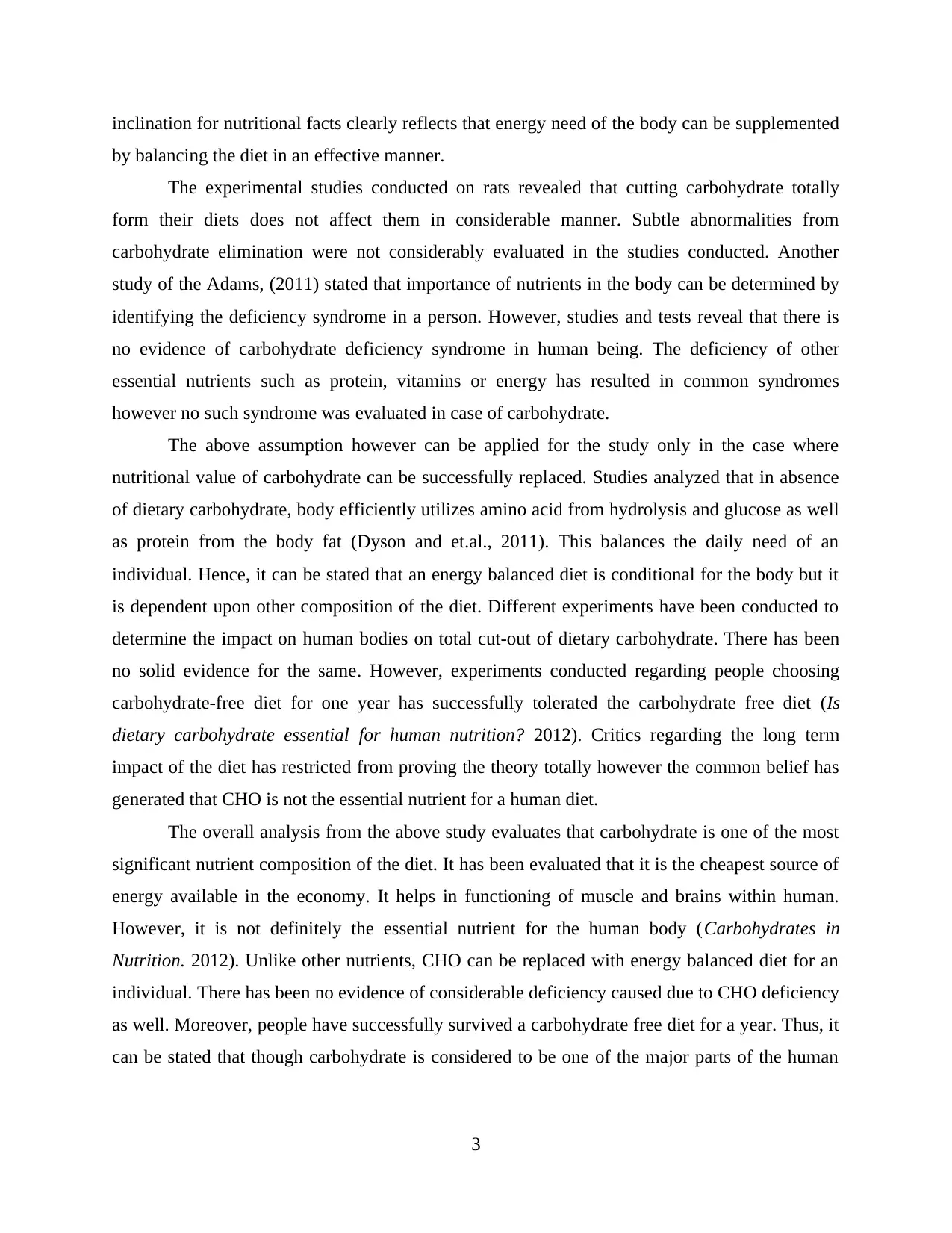
inclination for nutritional facts clearly reflects that energy need of the body can be supplemented
by balancing the diet in an effective manner.
The experimental studies conducted on rats revealed that cutting carbohydrate totally
form their diets does not affect them in considerable manner. Subtle abnormalities from
carbohydrate elimination were not considerably evaluated in the studies conducted. Another
study of the Adams, (2011) stated that importance of nutrients in the body can be determined by
identifying the deficiency syndrome in a person. However, studies and tests reveal that there is
no evidence of carbohydrate deficiency syndrome in human being. The deficiency of other
essential nutrients such as protein, vitamins or energy has resulted in common syndromes
however no such syndrome was evaluated in case of carbohydrate.
The above assumption however can be applied for the study only in the case where
nutritional value of carbohydrate can be successfully replaced. Studies analyzed that in absence
of dietary carbohydrate, body efficiently utilizes amino acid from hydrolysis and glucose as well
as protein from the body fat (Dyson and et.al., 2011). This balances the daily need of an
individual. Hence, it can be stated that an energy balanced diet is conditional for the body but it
is dependent upon other composition of the diet. Different experiments have been conducted to
determine the impact on human bodies on total cut-out of dietary carbohydrate. There has been
no solid evidence for the same. However, experiments conducted regarding people choosing
carbohydrate-free diet for one year has successfully tolerated the carbohydrate free diet (Is
dietary carbohydrate essential for human nutrition? 2012). Critics regarding the long term
impact of the diet has restricted from proving the theory totally however the common belief has
generated that CHO is not the essential nutrient for a human diet.
The overall analysis from the above study evaluates that carbohydrate is one of the most
significant nutrient composition of the diet. It has been evaluated that it is the cheapest source of
energy available in the economy. It helps in functioning of muscle and brains within human.
However, it is not definitely the essential nutrient for the human body (Carbohydrates in
Nutrition. 2012). Unlike other nutrients, CHO can be replaced with energy balanced diet for an
individual. There has been no evidence of considerable deficiency caused due to CHO deficiency
as well. Moreover, people have successfully survived a carbohydrate free diet for a year. Thus, it
can be stated that though carbohydrate is considered to be one of the major parts of the human
3
by balancing the diet in an effective manner.
The experimental studies conducted on rats revealed that cutting carbohydrate totally
form their diets does not affect them in considerable manner. Subtle abnormalities from
carbohydrate elimination were not considerably evaluated in the studies conducted. Another
study of the Adams, (2011) stated that importance of nutrients in the body can be determined by
identifying the deficiency syndrome in a person. However, studies and tests reveal that there is
no evidence of carbohydrate deficiency syndrome in human being. The deficiency of other
essential nutrients such as protein, vitamins or energy has resulted in common syndromes
however no such syndrome was evaluated in case of carbohydrate.
The above assumption however can be applied for the study only in the case where
nutritional value of carbohydrate can be successfully replaced. Studies analyzed that in absence
of dietary carbohydrate, body efficiently utilizes amino acid from hydrolysis and glucose as well
as protein from the body fat (Dyson and et.al., 2011). This balances the daily need of an
individual. Hence, it can be stated that an energy balanced diet is conditional for the body but it
is dependent upon other composition of the diet. Different experiments have been conducted to
determine the impact on human bodies on total cut-out of dietary carbohydrate. There has been
no solid evidence for the same. However, experiments conducted regarding people choosing
carbohydrate-free diet for one year has successfully tolerated the carbohydrate free diet (Is
dietary carbohydrate essential for human nutrition? 2012). Critics regarding the long term
impact of the diet has restricted from proving the theory totally however the common belief has
generated that CHO is not the essential nutrient for a human diet.
The overall analysis from the above study evaluates that carbohydrate is one of the most
significant nutrient composition of the diet. It has been evaluated that it is the cheapest source of
energy available in the economy. It helps in functioning of muscle and brains within human.
However, it is not definitely the essential nutrient for the human body (Carbohydrates in
Nutrition. 2012). Unlike other nutrients, CHO can be replaced with energy balanced diet for an
individual. There has been no evidence of considerable deficiency caused due to CHO deficiency
as well. Moreover, people have successfully survived a carbohydrate free diet for a year. Thus, it
can be stated that though carbohydrate is considered to be one of the major parts of the human
3
Paraphrase This Document
Need a fresh take? Get an instant paraphrase of this document with our AI Paraphraser
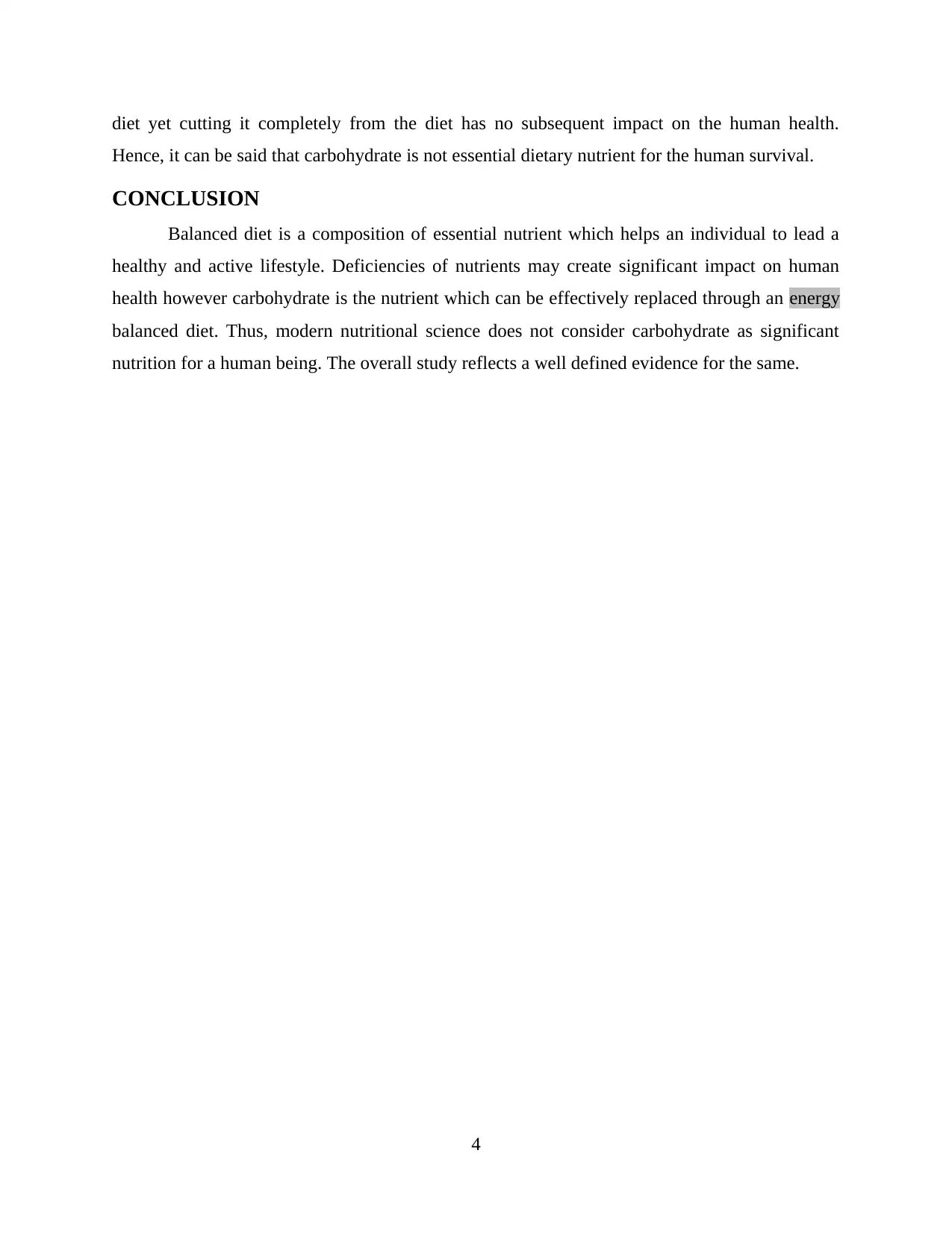
diet yet cutting it completely from the diet has no subsequent impact on the human health.
Hence, it can be said that carbohydrate is not essential dietary nutrient for the human survival.
CONCLUSION
Balanced diet is a composition of essential nutrient which helps an individual to lead a
healthy and active lifestyle. Deficiencies of nutrients may create significant impact on human
health however carbohydrate is the nutrient which can be effectively replaced through an energy
balanced diet. Thus, modern nutritional science does not consider carbohydrate as significant
nutrition for a human being. The overall study reflects a well defined evidence for the same.
4
Hence, it can be said that carbohydrate is not essential dietary nutrient for the human survival.
CONCLUSION
Balanced diet is a composition of essential nutrient which helps an individual to lead a
healthy and active lifestyle. Deficiencies of nutrients may create significant impact on human
health however carbohydrate is the nutrient which can be effectively replaced through an energy
balanced diet. Thus, modern nutritional science does not consider carbohydrate as significant
nutrition for a human being. The overall study reflects a well defined evidence for the same.
4
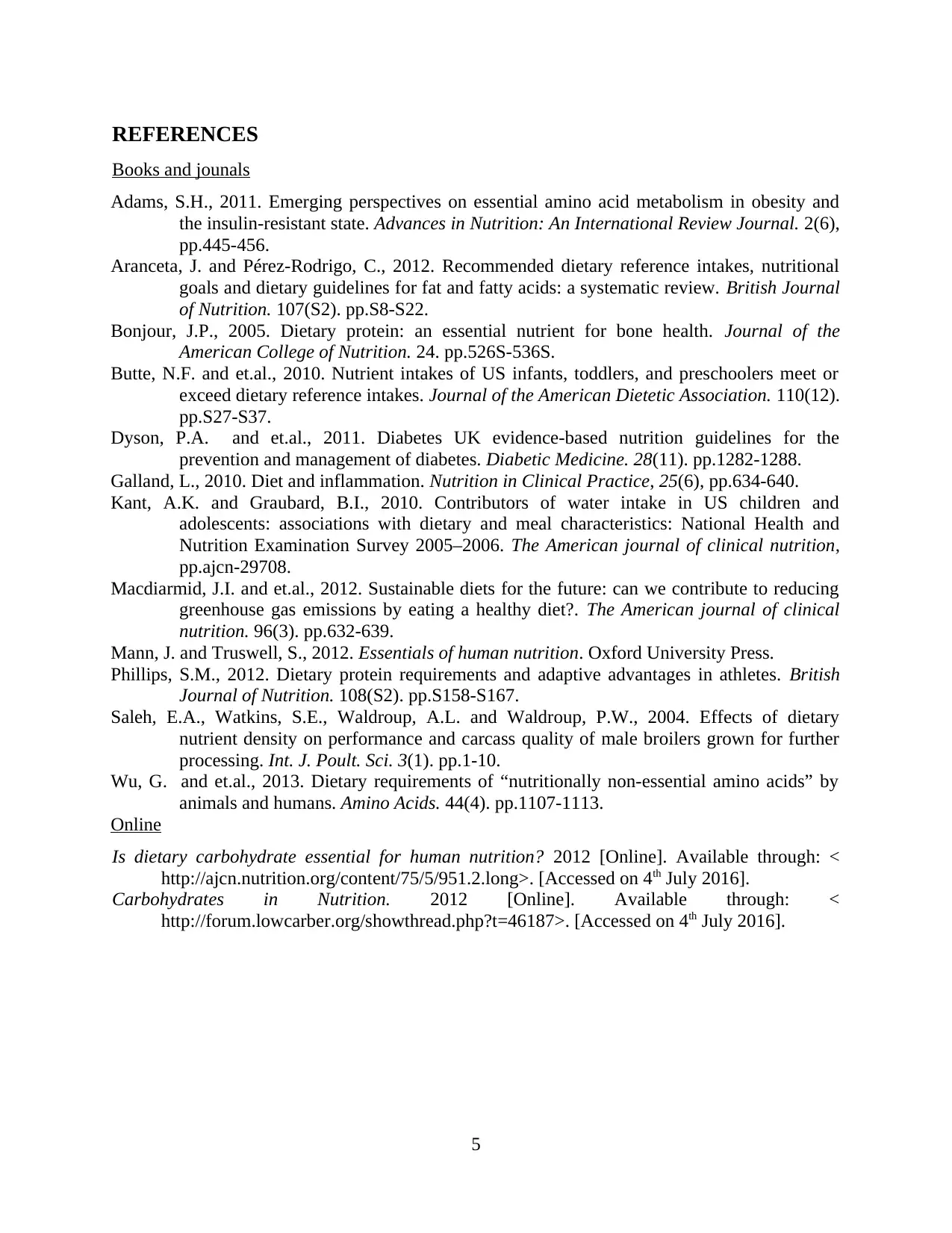
REFERENCES
Books and jounals
Adams, S.H., 2011. Emerging perspectives on essential amino acid metabolism in obesity and
the insulin-resistant state. Advances in Nutrition: An International Review Journal. 2(6),
pp.445-456.
Aranceta, J. and Pérez-Rodrigo, C., 2012. Recommended dietary reference intakes, nutritional
goals and dietary guidelines for fat and fatty acids: a systematic review. British Journal
of Nutrition. 107(S2). pp.S8-S22.
Bonjour, J.P., 2005. Dietary protein: an essential nutrient for bone health. Journal of the
American College of Nutrition. 24. pp.526S-536S.
Butte, N.F. and et.al., 2010. Nutrient intakes of US infants, toddlers, and preschoolers meet or
exceed dietary reference intakes. Journal of the American Dietetic Association. 110(12).
pp.S27-S37.
Dyson, P.A. and et.al., 2011. Diabetes UK evidence‐based nutrition guidelines for the
prevention and management of diabetes. Diabetic Medicine. 28(11). pp.1282-1288.
Galland, L., 2010. Diet and inflammation. Nutrition in Clinical Practice, 25(6), pp.634-640.
Kant, A.K. and Graubard, B.I., 2010. Contributors of water intake in US children and
adolescents: associations with dietary and meal characteristics: National Health and
Nutrition Examination Survey 2005–2006. The American journal of clinical nutrition,
pp.ajcn-29708.
Macdiarmid, J.I. and et.al., 2012. Sustainable diets for the future: can we contribute to reducing
greenhouse gas emissions by eating a healthy diet?. The American journal of clinical
nutrition. 96(3). pp.632-639.
Mann, J. and Truswell, S., 2012. Essentials of human nutrition. Oxford University Press.
Phillips, S.M., 2012. Dietary protein requirements and adaptive advantages in athletes. British
Journal of Nutrition. 108(S2). pp.S158-S167.
Saleh, E.A., Watkins, S.E., Waldroup, A.L. and Waldroup, P.W., 2004. Effects of dietary
nutrient density on performance and carcass quality of male broilers grown for further
processing. Int. J. Poult. Sci. 3(1). pp.1-10.
Wu, G. and et.al., 2013. Dietary requirements of “nutritionally non-essential amino acids” by
animals and humans. Amino Acids. 44(4). pp.1107-1113.
Online
Is dietary carbohydrate essential for human nutrition? 2012 [Online]. Available through: <
http://ajcn.nutrition.org/content/75/5/951.2.long>. [Accessed on 4th July 2016].
Carbohydrates in Nutrition. 2012 [Online]. Available through: <
http://forum.lowcarber.org/showthread.php?t=46187>. [Accessed on 4th July 2016].
5
Books and jounals
Adams, S.H., 2011. Emerging perspectives on essential amino acid metabolism in obesity and
the insulin-resistant state. Advances in Nutrition: An International Review Journal. 2(6),
pp.445-456.
Aranceta, J. and Pérez-Rodrigo, C., 2012. Recommended dietary reference intakes, nutritional
goals and dietary guidelines for fat and fatty acids: a systematic review. British Journal
of Nutrition. 107(S2). pp.S8-S22.
Bonjour, J.P., 2005. Dietary protein: an essential nutrient for bone health. Journal of the
American College of Nutrition. 24. pp.526S-536S.
Butte, N.F. and et.al., 2010. Nutrient intakes of US infants, toddlers, and preschoolers meet or
exceed dietary reference intakes. Journal of the American Dietetic Association. 110(12).
pp.S27-S37.
Dyson, P.A. and et.al., 2011. Diabetes UK evidence‐based nutrition guidelines for the
prevention and management of diabetes. Diabetic Medicine. 28(11). pp.1282-1288.
Galland, L., 2010. Diet and inflammation. Nutrition in Clinical Practice, 25(6), pp.634-640.
Kant, A.K. and Graubard, B.I., 2010. Contributors of water intake in US children and
adolescents: associations with dietary and meal characteristics: National Health and
Nutrition Examination Survey 2005–2006. The American journal of clinical nutrition,
pp.ajcn-29708.
Macdiarmid, J.I. and et.al., 2012. Sustainable diets for the future: can we contribute to reducing
greenhouse gas emissions by eating a healthy diet?. The American journal of clinical
nutrition. 96(3). pp.632-639.
Mann, J. and Truswell, S., 2012. Essentials of human nutrition. Oxford University Press.
Phillips, S.M., 2012. Dietary protein requirements and adaptive advantages in athletes. British
Journal of Nutrition. 108(S2). pp.S158-S167.
Saleh, E.A., Watkins, S.E., Waldroup, A.L. and Waldroup, P.W., 2004. Effects of dietary
nutrient density on performance and carcass quality of male broilers grown for further
processing. Int. J. Poult. Sci. 3(1). pp.1-10.
Wu, G. and et.al., 2013. Dietary requirements of “nutritionally non-essential amino acids” by
animals and humans. Amino Acids. 44(4). pp.1107-1113.
Online
Is dietary carbohydrate essential for human nutrition? 2012 [Online]. Available through: <
http://ajcn.nutrition.org/content/75/5/951.2.long>. [Accessed on 4th July 2016].
Carbohydrates in Nutrition. 2012 [Online]. Available through: <
http://forum.lowcarber.org/showthread.php?t=46187>. [Accessed on 4th July 2016].
5
⊘ This is a preview!⊘
Do you want full access?
Subscribe today to unlock all pages.

Trusted by 1+ million students worldwide
1 out of 6
Related Documents
Your All-in-One AI-Powered Toolkit for Academic Success.
+13062052269
info@desklib.com
Available 24*7 on WhatsApp / Email
![[object Object]](/_next/static/media/star-bottom.7253800d.svg)
Unlock your academic potential
Copyright © 2020–2026 A2Z Services. All Rights Reserved. Developed and managed by ZUCOL.





